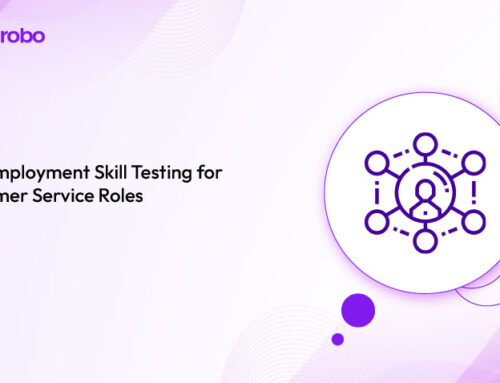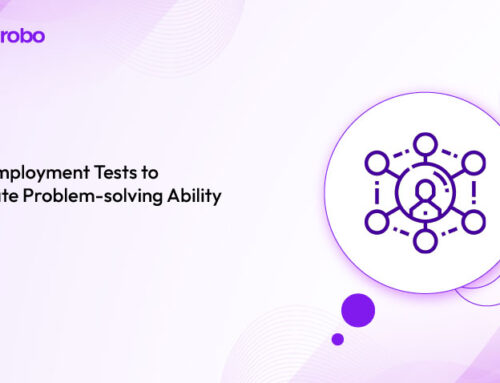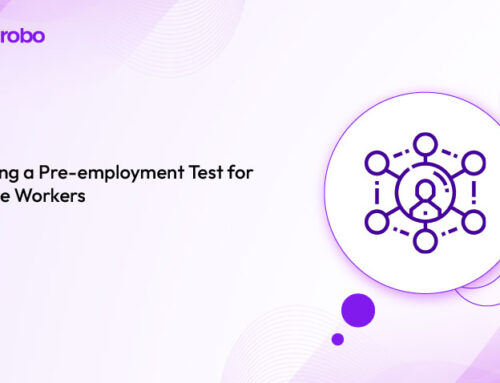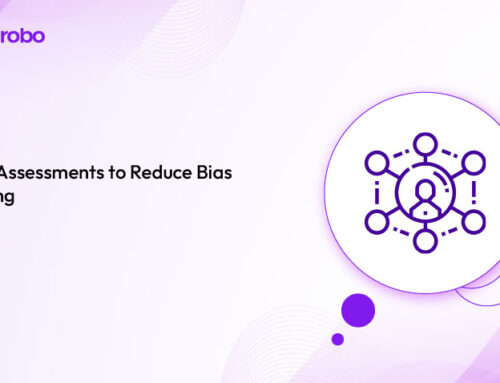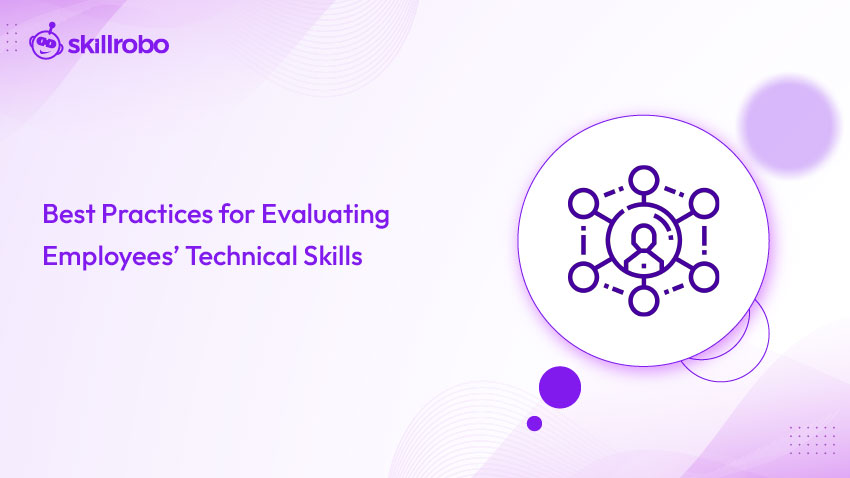
Key Takeaways
- Employee skill assessment ensures objective evaluation of technical abilities, helping businesses close skill gaps and promote fairly.
- Customized, role-specific assessments combined with cognitive evaluations provide a complete picture of employee capabilities.
- Ongoing skill assessments are critical for keeping teams competitive as industries and technologies evolve.
- Skillrobo simplifies employee assessment with customizable templates, secure testing, and real-time analytics.
Why Technical Skill Assessments Matter for Business Success
Technical expertise is no longer optional for modern businesses — it’s critical to staying competitive, driving innovation, and achieving sustainable growth. Modern organizations need employees who can not only demonstrate theoretical knowledge but also apply their skills effectively in real-world situations.
Despite this need, many companies still rely on traditional hiring signals like resumes, job titles, or personal impressions when evaluating talent. These outdated methods often miss deeper insights into an employee’s actual capabilities, resulting in skill gaps, performance challenges, and costly hiring mistakes.
A structured employee skill assessment offers a smarter, data-driven solution. It enables businesses to accurately measure technical competencies, uncover hidden skill gaps, and make informed decisions about promotions, training investments, and team development. Skill assessments provide the clarity companies need to build agile, resilient, and high-performing teams that are prepared to meet current and future demands.
By focusing on skill-based evaluation rather than assumptions, businesses can strengthen their workforce, improve retention, and position themselves for sustainable growth.
What is Employee Skill Assessment?
Employee skill assessment is the structured and objective process of evaluating an individual’s technical competencies, cognitive abilities, soft skills, and job-relevant knowledge. Instead of relying on resumes, job titles, or gut feelings, businesses use carefully designed assessments, such as skill-based tests, cognitive evaluations, and behavioral assessments, to gain deeper, measurable insights into an employee’s true abilities.
Skill assessments provide a clear, data-driven view of a person’s strengths, development areas, and future potential.
They are not limited to technical expertise but also evaluate problem-solving skills, communication abilities, adaptability, and other competencies critical to modern roles.
Implementing skill assessments empowers organizations to:
-
Reduce bias in evaluations by focusing on objective performance rather than subjective impressions.
-
Improve workforce planning by identifying current skill sets and future training needs.
-
Create targeted training programs that close skills gaps and prepare employees for evolving business demands.
-
Build stronger, future-ready teams that are agile, skilled, and aligned with organizational goals.
Ultimately, employee skill assessments help businesses move beyond assumptions, ensuring that talent decisions are informed, strategic, and aligned with long-term growth objectives. It’s about understanding where employees are today and preparing them for the roles they can successfully grow into tomorrow.
Why Evaluating Technical Skills Matters
Neglecting to evaluate technical skills systematically can create significant risks for businesses.
Promotions or hiring decisions based solely on confidence, past experience, or gut feelings often lead to underperformance, misaligned teams, and missed organizational goals.
Without proper skill assessments, companies risk:
-
Placing employees in roles they are not technically prepared for
-
Slowing down project delivery due to skill mismatches
-
Damaging client trust with inconsistent quality and expertise
On the other hand, investing in regular technical skill evaluations enables organizations to make smarter, more strategic decisions.
By implementing structured skill assessments, companies can:
-
Promote fairly based on merit, ensuring advancement opportunities are awarded to those truly equipped for the next level and reducing favoritism at work.
-
Create better training and development programs by pinpointing specific skill gaps and tailoring learning initiatives to real needs.
-
Proactively fill skill gaps before they impact business performance, allowing for better succession planning and role readiness.
-
Enhance innovation and productivity by ensuring teams are composed of technically proficient employees who can execute ideas quickly and effectively.
-
Retain top performers with clear growth paths, showing employees that advancement is based on measurable skills and achievements.
Proper technical skill evaluation is not just about hiring the right person today — it’s about building a sustainable, skilled workforce that can adapt, grow, and drive long-term business success. In a market where innovation and agility define winners, companies that prioritize skills over assumptions consistently outperform competitors.
Best Practices for Evaluating Employees’ Technical Skills
Evaluating technical skills is about more than checking boxes or administering simple tests.
To truly understand an employee’s technical capability, businesses must adopt a structured, strategic approach focused on real-world application.
Skill assessments should reflect the actual demands of the role, be tailored to business needs, and evolve with changing technologies.
Here’s how companies can set up a technical evaluation process that drives smarter hiring, development, and team performance.
1. Define the Right Skills for Each Role
Without clear benchmarks, technical assessments risk being inconsistent and incomplete.
Start by mapping essential skills and competencies for every role within the organization.
Using competency assessment tools ensures the process is standardized across departments and aligned with business objectives.
Example:
A data analyst position might require proficiency in SQL, Python, and data visualization tools like Tableau, while a cybersecurity analyst may need expertise in threat detection and risk analysis.
2. Use Role-Specific, Practical Assessments
Generic tests often fail to measure true technical capability.
Effective assessments must mirror real-world tasks and challenges that employees will face in their roles.
Using pre-employment assessment tools, companies can build customized technical evaluations for specific functions.
Example:
A marketing analyst might be asked to create a complete campaign performance report using real datasets instead of answering multiple-choice marketing theory questions.
3. Combine Technical and Cognitive Skill Testing
While technical proficiency is crucial, critical thinking and problem-solving are equally important.
Pair technical assessments with cognitive skill tests to evaluate candidates’ adaptability, reasoning, and decision-making under pressure.
Example:
An IT engineer could be tasked with configuring a server and then troubleshooting a simulated outage, testing both technical execution and analytical skills.
4. Make Skill Assessments an Ongoing Process
Technical skills evolve rapidly as industries and technologies change.
Evaluating employees only at the point of hiring is insufficient for long-term success.
Implement regular skill audits through employee assessment software to keep skills current and relevant.
Example:
Cybersecurity staff should undergo annual skills evaluations to stay prepared for new cyber threats and security protocols.
5. Blend Behavioral Assessments Into the Process
Technical ability without the right attitude or collaboration skills can hurt team dynamics.
Incorporate behavioral assessments to evaluate soft skills like communication, leadership potential, and teamwork.
Example:
Instead of just evaluating coding ability, assess how software developers participate in agile stand-ups, handle feedback, and collaborate on cross-functional teams.
6. Customize Assessments for Remote Roles
Remote roles bring unique challenges like self-discipline, independent communication, and virtual collaboration.
Design assessments that reflect these needs by incorporating communication skills assessments alongside technical evaluations.
Example:
A remote project manager may be evaluated on their ability to manage virtual collaboration platforms, coordinate remote teams, and maintain project updates effectively across digital channels.
Common Mistakes to Avoid in Technical Skill Assessments
Effective skill assessment is not just about what you evaluate — it’s equally important to recognize the common pitfalls that can undermine the process.
Organizations often make mistakes that lead to inaccurate evaluations, overlooked talent, or even biased hiring decisions.
Avoiding these errors ensures that your technical skill assessments remain fair, reliable, and valuable for long-term workforce planning.
Here are some of the most frequent mistakes — and smarter alternatives you can adopt.
1. Relying Solely on Certifications
Certifications can validate knowledge but do not always reflect an employee’s ability to apply skills in real-world scenarios.
Candidates might excel at passing standardized exams but struggle when faced with practical challenges.
Better approach:
Combine certifications with hands-on technical tasks, simulations, and project-based assessments to gauge actual proficiency.
2. Using One-Size-Fits-All Tests
Generic or overly broad assessments fail to capture the unique demands of specific job roles.
Not every role requires the same technical depth or skill focus.
Better approach:
Customize technical evaluations based on job-specific competencies.
Using platforms like online production skills assessments ensures that tests are relevant to the skills needed.
3. Skipping Behavioral and Cognitive Testing
Technical skills are critical, but without cognitive flexibility or strong interpersonal abilities, employees may struggle in dynamic work environments.
Better approach:
Blend technical assessments with behavioral evaluations and cognitive skill testing to create a comprehensive talent profile.
4. Treating Skill Assessment as a One-Time Activity
Skills degrade over time if not used, especially as technology advances.
Assessing employees only at hiring fails to capture their current capabilities over the long term.
Better approach:
Implement regular skills reassessments using employee assessment platforms to maintain a technically agile workforce, especially after major tech or organizational changes.
How Skillrobo Simplifies Employee Skill Assessment
Skillrobo streamlines employee skill evaluation through smart, scalable solutions tailored to business needs.
Role-Specific Test Templates
Skillrobo offers pre-built test templates aligned to specific job functions.
Whether for technical, administrative, or customer service roles, businesses can quickly deploy targeted assessments.
For example, administrative skill tests ensure operational roles are evaluated correctly.
Customizable Assessments Across Skills
Businesses can customize technical, cognitive, and behavioral tests to build complete candidate profiles.
Evaluating collaboration fit is easier with insights from identifying personality traits.
Secure Proctoring for Remote Testing
Skillrobo ensures secure online testing with AI monitoring and browser lockdowns.
Even for pink-collar jobs, secure assessments guarantee fairness in remote evaluations.
Real-Time Analytics
Skillrobo’s real-time dashboards deliver instant insights into skills, performance, and hiring trends.
Teams using creative sourcing strategies can align talent sourcing directly with assessed skills.
Scalable to Teams or Departments
Skillrobo adapts easily, whether assessing a few employees or full departments.
Integrated with sourcing tools for recruiters, it simplifies large-scale hiring workflows.
By combining speed, fairness, and customizability, Skillrobo empowers businesses to assess skills smarter and future-proof their teams.
Conclusion
Evaluating employees’ technical skills is no longer optional — it’s a critical strategy for companies aiming to stay competitive, agile, and future-ready.
Structured, ongoing skill assessments empower businesses to build stronger, more capable teams, ensure fair promotions, close critical skill gaps, and drive continuous innovation.
By setting clear benchmarks for each role, designing customized assessments aligned with real job requirements, and blending technical evaluations with behavioral and cognitive testing, companies can create a culture where skills, not assumptions, drive decision-making. Avoiding common assessment mistakes and making skill evaluation an ongoing process strengthens workforce planning and improves employee engagement.
Platforms like Skillrobo make skill assessments faster, more accurate, and easier to scale across teams or entire organizations.
With the right tools and a skill-first mindset, businesses can transform their hiring, development, and retention strategies, gaining a real strategic advantage for long-term growth and success.
Frequently Asked Questions
What is the best way to evaluate technical skills?
A mix of online tests, real-world assignments, live problem-solving tasks, and cognitive evaluations provides a complete picture of technical capability.
Why is skill assessment important for employees?
It ensures employees are equipped for current and future roles, supports workforce planning, and enhances engagement by showing clear growth opportunities.
How often should technical skills be reassessed?
Ideally, at least once a year, or whenever major technology or organizational changes occur.
Can Skillrobo help with large-scale employee assessments?
Yes. Skillrobo supports customizable assessments for individuals, teams, or departments, making it scalable for any business size.
Table of content
- Key Takeaways
- Why Technical Skill Assessments Matter for Business Success
- What is Employee Skill Assessment?
- Why Evaluating Technical Skills Matters
- Best Practices for Evaluating Employees’ Technical Skills
- Common Mistakes to Avoid in Technical Skill Assessments
- How Skillrobo Simplifies Employee Skill Assessment
- Frequently Asked Questions



